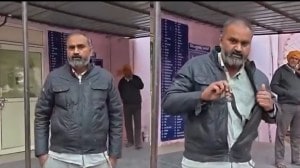Stay updated with the latest - Click here to follow us on Instagram
Demand keeps prostitution alive
Noted feminist and legal scholar Catherine MacKinnon presented a talk on Trafficking,Prostitution,and Inequality: Confronting the Demand on Thursday in a seminar hosted by Apne Aap Women Worldwide and The American Center.
Noted feminist and legal scholar Catherine MacKinnon presented a talk on Trafficking,Prostitution,and Inequality: Confronting the Demand on Thursday in a seminar hosted by Apne Aap Women Worldwide and The American Center.
Professor MacKinnon,who has authored several books like Are Women Human?,Sex Equality and Womens Lives,Mens Laws,has also represented the Bosnian women survivors of Serbian genocide in a trial that won them millions,thus marking the first legal recognition of rape as an act of genocide.
Speaking on the forces that have kept prostitution alive in todays world,she said that it is the male demand that has kept the institution alive. Men are willing to pay for sex. So prostitution exists. They know that sex and women are for sale and they can have them for a fair price. But more than anything else it is also a physical and an economic force of a man over a woman, she said.
In her trip to India,she has also visited various villages and red light areas in New Delhi,Bihar and West Bengal in order to study the lives of women and interacted with them. Another aspect of prostitution that MacKinnon highlighted in her talk was the debate on legalising prostitution. While countries like Victoria,Peru and Germany may have legalised prostitution,yet these countries have also recorded the highest rate of trafficking.
While trafficking itself may be illegal yet the people who deal in them know that there is a lot of money to be made in prostitution in these countries since it is legal. Moreover,these are also the places where the illegal sex industry has exploded. The other point that she stressed on was legalisation of prostitution meant putting their names down in government papers for various benefits that branded them as prostitutes for life.
For many women this is a temporary thing. Something to do to tide over the hard times and many women do want to get out of it,but if the names are put down on government register then they will forever be branded as prostitutes, said MacKinnon.
According to MacKinnon,what needs to be done is to criminalise the demand for sex from prostitutes,something that Sweden has implemented. The demand is driving this industry and if the purchase is criminalised then there will be a hope for equality. Apart from that what needs to be done is give women an option,so that they have a choice, she said.
The women in Bihar and West Bengal whom I met said the same thing that they needed a place to stay and they wanted access to education for themselves and their family, she added.







